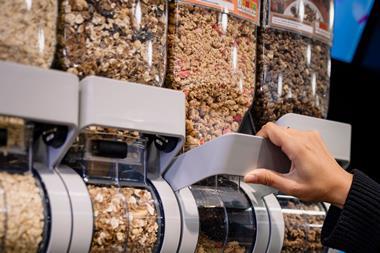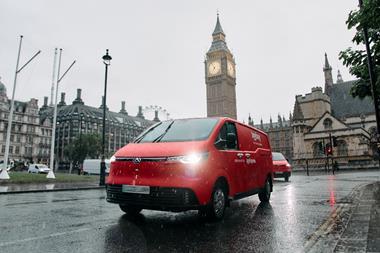Exporting own label products to expats and tourists is not the most lucrative of operations. So why do retailers do it? Ed Bedington reports
The two hardest things for the Brits to export are food and arms. That, at least, is the view of one retail industry pundit contacted for this feature. And he has a point. Given the strength of the pound, and the low perception of British food safety around the world, you can see why many firms have decided in recent years to keep their products closer to home.
Despite such problems, plenty of British companies have stuck to the difficult task of selling food and drink in overseas markets. This plucky band includes some of Britain's top food chains which have been quietly selling own label products overseas for years. Despite the headaches suffered by all food exporters, they, too, show no signs of wanting to quit this small, yet vibrant part of their business.
So why do retailers do it? In many ways, their overseas business is opportunistic. It has grown up usually on an ad hoc basis as a way of catering for the needs of Brits abroad. While some on holiday are more than willing to try out the local delicacies, there are large numbers of holidaymakers who are gasping for a proper cuppa. Expats, too, want the chance to buy products from the motherland. And, more often than not, the locals soon get a taste for British grub. That's why anywhere you find a Brit, chances are there'll be a store nearby selling everything from own label teabags to tins of baked beans.
But while most of this business is not part of some grand strategy, there are some that are actively pursuing opportunities overseas. And they are not just the big supermarket chains. Nisa-Today's has a busy export operation handled by Nisa International, which sells between £1.5m and £2m a year, most of it to Spanish operators. MD Sean Ramsden says: "It's difficult to sell some things, particularly commodities like rice and sugar because they are readily available anyway. But we do have success in products that are particularly English, like condiments and tomato sauce. Breakfast cereals, biscuits, confectionery and home baking do well too."
Margins are tight, says Ramsden, who admits Nisa makes very little money out of its export operation. So why do it? In Nisa's case, he says the real benefit is the extra volume the business generates. "In some cases the extra volume means it becomes viable to produce own label products that they wouldn't be able to do without those additional numbers," Ramsden adds.
He also points to another, more intangible, benefit: "It's also an extension of the brand. People go on holiday to Spain and they might see the product and recognise it and bring back that recognition to the UK."
Brand recognition is often cited as a good reason why a chain makes a foray overseas. It's certainly top of the agenda at Iceland, which has gone one stage further than many of its rivals by opening up 11 stores along the south coast of Spain, as well as three in Tenerife, as a franchise operation.
International business development manager Alistair Cooke says Iceland was approached by local organisations in Spain and Tenerife eager to operate under the Iceland fascia. Ex-Iceland staff living the expat life were involved in the scheme and Cooke says this has worked well.
"The stores weren't something we decided to do ourselves. The fact that they involve ex-Iceland staff is good because it means they have a full understanding of the working of the company," he explains.
The stores are run in a similar way to Iceland in the UK, which supplies all the goods and information needed. They are based mainly in tourist and expat hot spots, including Marbella, Benidorm, and areas where there is a high concentration of apartments.
But Iceland's export business is not confined to Spain, says Cooke. "In other areas, such as Malta, Gibraltar and Cyprus, the products are sold through local operators. Many of these have set aside specially dedicated areas for Iceland's frozen products within their stores."
He adds: "We are looking to develop our customers beyond expats and into the local population and that seems to be going well in Cyprus. We want to establish Iceland as a brand in its own right. On the continent we are not known as a chain of supermarkets, so the Iceland name can be a standalone brand like Birds Eye.
"It's something we are keen to grow and develop. It helps bring global recognition of the brand as well as extra revenue. Our aim is to get the brand known everywhere world domination I suppose!"
Other retailers are not aiming quite as high as Iceland. At the other end of the scale is Safeway. Its director of consumables John Haywood says own brand export is not a major focus for the multiple but he does not dismiss it as a waste of time. "Although it's not something that we concentrate on, I personally believe there is some potential out there. I don't think we'll be doing much with it in the next year, but hopefully we will look into it because it's another sales area and an opportunity to make more money," he adds.
It is clear, therefore, there are two sets of own brand exporters. There are those, such as Iceland and Nisa, who appear to have strong strategic reasons for selling overseas. Then there are the others for whom the money motive is the primary driving force. And who can blame them? If all you have to do is pick up the phone and take an order from an overseas operator who does all the work, and suffers all the hassles then clearly exporting own label goods will always be a nice little earner.
Sure there is always the danger of a retailer losing control of its brand by operating in this way. But provided the right sort of checks are done, this can be minimised. And that means the export business can be profitably opportunistic even when it's not strategic.
Whatever the reason for selling overseas, the retailers that do it benefit in a number of ways. First, they build extra sales. They also build loyalty among expats. Just as important, they start building awareness about their brand among the local population. And that could prove vital for any chain harbouring a desire for international expansion.
William Gordon, strategy partner in retail at consultants Accenture, says: "Using expats and tourists is a good way to penetrate foreign markets, because they are easy to convert and the market can act as a useful stepping stone into new markets. But it can also help build the company brand. Own label says a lot about a company to the consumer."
Kim Green, retail industry leader at PriceWaterhouseCoopers, agrees: "It's a good way of spreading the gospel about your brand. To use expats as a platform is quite smart." It can, he says, give you a respectable return while you re-educate the indigenous population. But Green warns: "The process would be one of osmosis unless you threw a great deal of money at it in terms of marketing."
As yet, few British retailers are spreading their wings overseas. Indeed, Tesco is the only example of a company which has gone beyond simply exporting own label goods to building a global presence. And since opening up its own stores around the world, it has begun to scale back its own label export operations.
The chain insists the export operation was never big business and laughs off any suggestion that it was done as the first step towards building an international presence.
World non-food buying director Christine Croft says: "We used to sell to distributors and wholesalers who would then sell on to retailers, but we've stopped that. This has allowed us to maintain control over the Tesco brand as we grow the global business. It's not something we're looking to develop as a business, and we've decided to concentrate on developing our own products for our own stores abroad."
Tesco still sells some products direct to a number of retailers where there is a trading history, adds Croft. One of those still supplied by Tesco is the Spinneys group in the United Arab Emirates, which uses UK brands to attract local and expat shoppers.
The company is one of the oldest supermarket groups in the region and has a number of stores in Dubai and Sharjah. Group general manager Richard Thorne says selling UK own label products gives it an edge over other retailers in the area.
"We have had a long and fruitful association with Tesco products and it is one of Spinneys' key USPs in this market which has a lot of European expats," he says.
Thorne adds that many of the local population also spend time in the UK and recognise the products. "We have sold the Tesco brands for more than eight years and the rate of sale continues to increase as the awareness in the region of the quality of Tesco brands grow.
"Tesco products add value to us and they are currently, with the exchange rate, exceptional value. Tesco products also perform as well as the market leaders so consumers are happy."
Spinneys is one of many retailers around the world happy to sell own label brands from a British retailer. But PWC's Green remains sceptical about the impact own label products can have in any marketplace. He says: "Established brands have far more power than private label products because they hold far more sway. Would people rather have Tesco tea or Typhoo?"
Accenture's Gordon disagrees, pointing out own label products have come a long way in the UK. "Own label has developed and we've seen a move in which they stand in their own right. We're now seeing a situation where own brand products are standing up to their branded rivals."
Waitrose is a perfect example of a company whose products have become a recognised quality brand in their own right. It is now exporting from the Isle of Man to Japan. Waitrose isn't the sort of company that does anything for opportunistic reasons, so it must have a deeper strategic objective for brokering deals with overseas retailers. Food from Britain's North American president Steve Dawson says Waitrose's position of high quality has placed it in a better position for taking on more competitive markets such as the US. "America is not an easy opportunity. A company would be launching as a brand in its own right which would require a great deal of money. Companies selling high end products like Waitrose will have better luck."
The fact that Waitrose is reluctant to talk about its activities is not unusual. Few retailers ever shout about what they are doing in foreign markets. Most claim it is such a small part of their business they just don't think about it. But PWC's Kim Green has another explanation: "It's a generalisation, but when people are experimenting with something they don't want to talk about it in case something goes wrong. They would rather keep it quiet until they can announce it as a success."
{{COVER FEATURE }}
Close menu
- Home
- Retail & Wholesale
-
Products & Suppliers
- Back to parent navigation item
- Products & Suppliers
-
Product Categories:
- Back to parent navigation item
- Product Categories:
- Alcoholic drinks
- Bakery
- Cereals & breakfast
- Cheese
- Chicken & poultry
- Chocolate
- Confectionery
- Crisps, nuts & snacks
- Dairy
- Fish
- Fresh produce
- Frozen
- Household
- Meat
- Own Label
- Sauces & condiments
- Seasonal
- Soft drinks
- Vaping
- Vegan & plant-based
- World foods
- Suppliers
- People
- Reports & Data
-
Topics A-Z
- Back to parent navigation item
- Topics A-Z
-
Popular topics:
- Back to parent navigation item
- Popular topics:
- Cost of living crisis
- Crime
- Deposit Return Schemes
- Finance
- Government & Regulation
- Health
- Inflation
- Loyalty
- Marketing
- Mergers & Acquisitions
- New Product Development
- Sourcing
- Supply chain
- Sustainability & environment
- Technology
- Ultra Processed Foods
- Vaping
- A-Z all topics
- Content by type:
- Events
- Ask iA (beta)
- Subscribe now
Sign in to comment on this article
Not logged in before? Register for FREE guest access today.
You will be able to:
- Read more stories
- Receive daily newsletters
- Comment on stories
Advert

















No comments yet